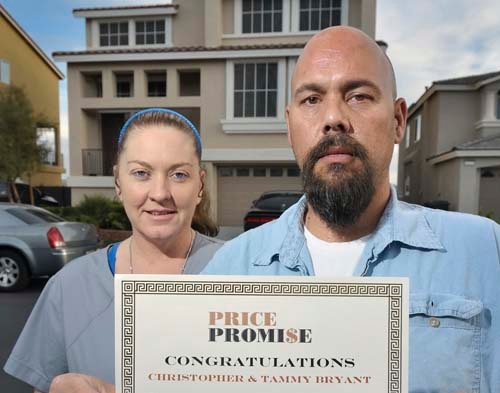Home price ‘promise’ eludes valley buyers

When American West Development Inc. touted its price promise as an antidote to plunging home sales four years ago, it pushed first-time buyers Chris and Tammy Bryant into starring roles in its promotions.
“It’s great peace of mind,” Chris Bryant said then of the promise, which helped persuade the couple to buy a Henderson home with a base price of $452,000.
The promise, and a similar but separate guarantee, were designed to calm jittery customers by offering a rebate on the difference between what they paid and a possibly lower list price for the same home three or five years later.
“When we looked at the model, all they kept saying was ‘price promise, price promise, price promise,'” Bryant said. “And they had this big banner in front saying ‘price promise.’ To me, that was the builder standing behind its product and that’s rare to find. It played a big role in deciding to buy here.”
But when the Bryants applied last October for what they expected to be a $138,000 rebate, they were turned down. So were a number of their neighbors.
The Bryants, who said they don’t know why they were rejected, had hoped to use their rebate to pay down their mortgage, which far exceeds the market value.
“We’re kind of stuck,” Bryant said.
Now the developer, which filed for Chapter 11 protection on March 1, wants to go a step further by using the broad power of the U.S. Bankruptcy Court to void the guarantees and promises it made in selling 187 homes in select subdivisions. Company records list 114 homeowners holding certificates issued when they bought their houses, a necessary document for claiming a rebate. It’s unclear why the numbers disagree.
Homebuyers have started to press their case in the run-up to an April 10 bankruptcy court hearing.
“Please grant us this five-year price guarantee so that we won’t be one of those who gave up and lost everything,” wrote Catherine and Renato Maballo Jr., in a letter to U.S. Bankruptcy Court Judge Mike Nakagawa. “We want the court to know how much hardship we went through just to keep our home and waiting for this day to come to grant us that five-year guarantee. This is the only hope for us to survive and give our children a better future.”
AMERICAN WEST’S ARGUMENT
But in court papers, American West attorneys argue that keeping the commitments would be a “significant risk of disruption and depletion” of company resources outweighing any benefit.
Further, the attorneys say that caveats on the price commitments mean rebates “in only a handful of instances, if any. However, (American West) also recognizes that it could face a multitude of claims or even litigation from homeowners who are upset about the decline in the real estate market in Las Vegas.”
Voiding all of the commitments as part of the bankruptcy process creates “an orderly, economical and equitable” way to deal with claims, the company argues.
“The company certainly understands the concerns of the affected homeowners,” American West President Robert Evans said in a statement.
The company does set aside $1.5 million for general unsecured claims against it, but it doesn’t specify in court papers who will get the money. When the full reorganization plan is filed, Evans said, “it will be clear that those funds are intended for compensation to the legitimate price promise and guarantee holders.”
‘PROOF OF OUR COMMITMENT’
As the housing bubble began to deflate, American West joined a smattering of homebuilders across the country — and even one in suburban London — that constructed marketing campaigns around price guarantees.
When promoting the promise in June 2008, American West’s former president, Larry Canarelli, called it “unmatched in this region. It’s more proof of our commitment to our homebuyers and the Las Vegas community.”
A survey last year by the National Association of Home Builders found only
6 percent of builders turned to guarantees to stimulate sales, while most others offered free upgrades, discounted closing costs, or help selling existing homes.
Patrick Duffy, principal at the consulting firm MetroIntelligence Real Estate Advisors, said developers generally took out insurance policies to cover guarantees, though he was not familiar with the American West version.
“The company should stand by the guarantee,” he said. “This doesn’t help the industry’s overall image.”
Before American West’s bankruptcy, all 16 formal rebate requests were rejected when the builder determined buyers violated one or more conditions.
One buyer sued in state court and lost. Another case is suspended by the bankruptcy.
Julia Hamby said her $122,000 rebate was rejected because she agreed to use American West’s preferred lender, which came with a reward from the builder. She, like others, said it was never made clear that accepting the small incentives would negate the guarantee.
“Why would I ever go for $4,000 in landscaping when the promise could be worth much more?” she said.
‘I SUSPECT THEY MADE UP THE CONDITIONS’
Some buyers contend the caveats were never spelled out.
“With something like this, I look at the small print and if I see anything about terms and conditions, I am on it like a shark,” said Trevor Henson, whose rebate application was rejected last year. “I suspect they made up the conditions when the prices came down and people actually remembered the guarantee.”
Some buyers promise the bankruptcy hearing will be just the start of the battle. “It’s going to get pretty nasty because we are not going away,” Hamby said.
Contact reporter Tim O’Reiley at toreiley@reviewjournal.com or 702-387-5290.